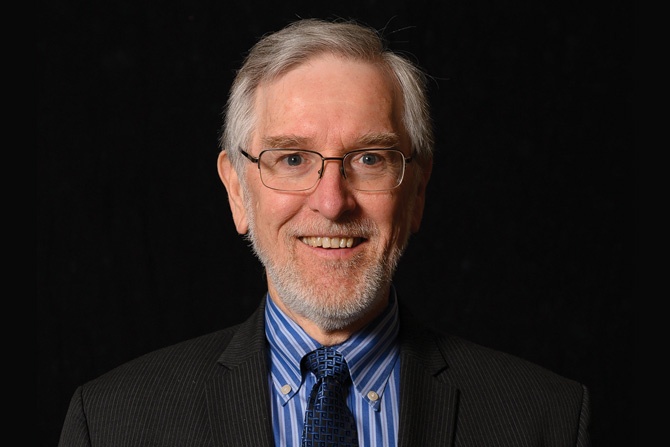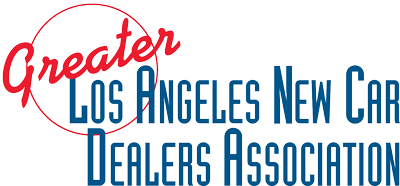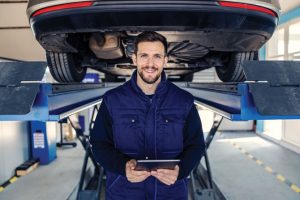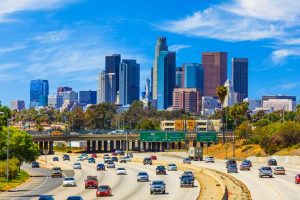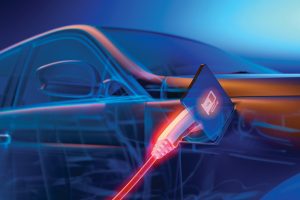GLANCDA Q&A With Peter Hoffman
I understand that you and your family are selling your stores and getting out of the retail automobile business. Your family has been selling vehicles in Southern California for a long time. Can you give us a short review of that history?
Sure. My grandfather, Paul G. Hoffman, dropped out of college to sell cars in Chicago in the early 20th century. He soon saw that Los Angeles was a strong car market, so he moved out here and began selling Studebakers door-to-door. He started his own Studebaker dealership in downtown LA and was very much a part of the early retail automotive industry in LA. He kept his Figueroa Street store but moved to the factory side, rising to be the president of the company in South Bend, Indiana. After the war, my father, Lathrop Hoffman, bought that store and owned it until Studebaker ceased operations in the late 1950s. In 1971, my father bought the VW store in Fontana — on Sierra Avenue. He then moved to Monrovia, was awarded the Honda franchise and bought the Pontiac franchise from the Bozzani family. He also had stores in Fort Bragg and Eureka by then. When I joined the organization in 1988, my sisters Mary and Elizabeth were already working in the office, and the Eureka and Fort Bragg stores had been sold. They had just opened an Acura store in Alhambra and a Lincoln-Mercury-Merkur store in Monrovia. Over the next few years, we acquired Chevrolet, Saturn, Daihatsu, Isuzu, Oldsmobile, Buick, Mazda and Subaru. Now, many of those franchises have gone away, been sold or given back to the factory, with Chevrolet, Honda and Subaru being the last to go. That sale is now pending. My nephew, Mike Hoffman, general manager of our Chevrolet store, is the only one continuing in the business.
Would you please tell us about your father, Lathrop Hoffman and his influence on your life?
My father was a real entrepreneur, always learning, creating, investing, building. He was able to connect with people quickly, and those connections were almost always lasting. He knew how to distill problems down to the central issue, analyze the choices and get a consensus on a solution. He knew the right thing to do, in business and personally. He was a handshake businessman and a caring human being. I really enjoyed working with him for the 26 years we worked together. He loved automobiles, enjoyed the industry with full awareness of its flaws and had many wonderful relationships with the people in it. I am not able to be him, but I have tried to keep Sierra working as he would have wanted it to work. His influence is still felt.
Did you aspire to be part of the automotive industry, or did you have other plans?
After college, I was an engineer for a while and then I went to law school and was a lawyer for a while. I was not particularly interested in the car business, but when my father asked me to change careers and join his business, I felt working with him and helping to run a business was a great opportunity, so I agreed. My wife, our two children and I moved from Irvine to Monrovia and restructured our lives around the family business. I was 37 then.
Your nephew, Mike; your sisters, Mary and Liz; and your daughter, Leah, have all been part of the family business. How have they each contributed?
My sister, Mary, was a long-term employee. She was here in 1988 when I got here, working in the office. Over the years, she worked as the office manager in several stores. She ended up managing our management company before she retired in 2019. Throughout that time, and now, she is a director and the secretary of the company. Liz worked in the office doing a variety of tasks. I mentioned that Mike is the general manager of our Chevrolet store. It’s an important position, and he is the car guy of the group. My daughter, Leah, is our compliance person. She makes sure we are obeying all the crazy rules.
Your mission statement says, “We are dedicated to a tradition of courtesy, honesty and continuous improvement in our work. We take great pride in ourselves, our community and the delivery of value to our customers.” What’s the story behind your mission statement?
In the early 1990s, before vision statements were part of the game, we got all our managers together in a banquet room at a local hotel where we had breakfast and brainstormed about what we all felt Sierra’s culture should be. My father led the meeting. We came up with a mission statement. We circulated it among all employees, got their feedback and finalized it accordingly. We’ve embraced it ever since.
So, as you approach the closing of the sale of your family’s business, what goes through your mind?
As dealers, we are embedded in the communities we serve. We owe our employees a good income and a productive working environment, our customers a fair, open and information-rich sales and service experience and our factories, banks and vendors a fair return on the relationship. New vehicle sales are different from used vehicle sales. Service is a completely different business, and the parts department is like running a hardware store. In California, we operate in an irrationally hostile business environment, and our factories add layers of complexity to our business that I suspect are somewhat unique. It is a very complicated business that most dealers do extremely well. Stepping out from under that five-ball juggle is something of a relief.
But I’ve been doing this for 33 years. I know and admire a lot of people in this business and have a great relationship with some amazing co-workers. Being one of the 800 or 900 dealers in California isn’t something you think about much until you are contemplating not being one of them. Dealers are the local arm of an amazingly complicated global industry. That industry is essential to any first-world country’s economic and strategic well-being. We are an important part of that. But automotive retailers are also very important to their communities and their customers — we are the consumer interface for the purchase and ownership of an expensive and necessary asset. Our industry is now confronting a number of exciting and risky transitions. The accelerating drift into electric cars and trucks is dependent on many things coming together — charging accessibility for nonhomeowners, grid capacity, consumer acceptance of range and likely utility limitations, battery availability (and reliability and safety), and fixing the global supply network that is now so challenged. How will transportation issues generally play into solutions for climate change? Of course, there is dealer consolidation (of which our sale is a part), but we also have the drift away from brick and mortar as the internet world consumes us; the move to online transactions — which is impeded in California by the legislature’s absolutely unforgivable refusal to delete the prohibition against e-contracting in the sale of vehicles. What does the future of ride-sharing mean to private ownership of vehicles? There are evolving forms of currency and changing factory strategies for pricing and selling vehicles which seem to be moving aggressively to cast the dealer as a delivery agent rather than a traditional retailer. We are experiencing a broader competitive landscape with differently regulated, online-focused, no dealer models feeling their way into the marketplace with losses that no dealer could compete against, supported by stock prices that sustain practices that used to look more like dumping than competing. And then there’s social media. The only saving grace with a communication platform that can mobilize thousands to attack people and companies relentlessly with little or no facts or understanding is that it has an incredibly short attention span. All of this is exciting and important and presents challenges that I would enjoy being a part of addressing, but I also enjoy the quote from King George (the movie): It is easier to whisper advice from the shadows than to bear its merits at the point of attack.
Why is it important to be a GLANCDA member? What makes it beneficial?
GLANCDA is the public voice of LA dealers. Many things I just spoke about will be resolved with the input and assistance of dealers acting through GLANCDA. An association can speak for dealers and press for solutions that might be awkward or impossible for an individual dealer to do. Because of their roots in almost every community in the state, dealers do have some power. I think our associations have also represented us well over the years, advocating not just for dealers’ narrow interests but also for the community as a whole. Dealers do well if their communities are strong. Our relationships with legislators shape their image of dealers generally. News organizations and legislators love to vilify dealers based on historical notions that have little or nothing to do with the professionally managed, high-quality operations we see today. The days of Hull-Dobbs tricks are long gone. It is largely through dealer involvement in their trade associations that the old images fade. Also, when legislative intervention is necessary, GLANDCA has been there, most notably in working with Catherine Barger and the county to create a protocol that let dealers reopen their showrooms last year. That would have taken much longer without the efforts of Bob Smith and a few dealer principals working directly with Supervisor Barger. After we opened, their help gave us some confidence that we were doing right by customers and employees on health issues. The associations were there fighting for us, watching for us, and getting information on what we had to do, which is not easy in this state. Over the years there have been many instances where GLANCDA’s existence afforded dealers some real influence where it was truly needed.
Would you please share some memorable issues you’ve been involved with as a board member with GLANCDA and CNDA?
I’ve been very lucky to be a part of the Greater Los Angeles New Car Dealer Association and the California New Car Dealer Association for many, many years. As a director, regional VP or chairman, I’ve been in a position to watch, participate in and experience some of the successes these associations have produced, as well as the frustrations of the legal and regulatory world dealers operate in. The statewide association has been critical in promoting dealer positions with increased doc fees, franchise protections and numerous tweaks to proposed laws making them less onerous to dealers. From Prop 64, which solved the unfair competition law’s grossly unfair applications for all businesses in the state, to the current effort to tame PAGA, the CNCDA saves dealers from many burdens, expenses and litigation that would otherwise land squarely on their shoulders. That doesn’t mean there isn’t a continuous stream of challenges coming from the legislature, the courts, public health, the plaintiffs’ bar and the OEMs. But our associations have provided us with critical guidance on how to respond and, whether it’s Prop 65 or new compensation regimes, how to comply.
What are some of the national issues that NADA and AIADA have tackled that you have supported or opposed?
NADA provides dealers with that voice in national issues. From Cash for Clunkers to exempting dealers from the jurisdiction of the Consumer Financial Protection Bureau (CFPB), NADA has been an important advocate for dealers. They also provide resources in training, guidance and general policy matters — all to support the dealer body.
What are the imminent threats and challenges currently facing the franchise system? What is the need for continued engagement and activism, and why is it important for dealers to lend their voices and support in the future?
As I’ve mentioned earlier, there is a lot going on. Changes are coming at us all with increasing velocity. Dealers will need to keep a place at the table to ensure they are part of the model that is ultimately adopted. The work to be done will require creativity, flexibility, coordination, communication and advocacy. Every dealer should be focused on doing their part. There are alternatives to the franchise system being implemented right now. The marketplace is competitive. I think the franchise system is beneficial to customers, employees, vendors and the OEMs, but it is evolving. Dealers need to guide that evolution. It is very risky to assume that it will include them without them taking a rowing oar in its development.
What three things have you learned that you would pass on to someone you are mentoring?
- Make sure that revenue exceeds expenses.
- Anytime somebody leaves your organization, make sure they leave with their head high, feeling respected.
- Get involved in your community and learn everything you can from your fellow dealers.



